#WorkplaceValues
Explore tagged Tumblr posts
Text
Spiritual Guidance for Modern Executives from Ancient Texts

Concept Overview
In today's fast-paced corporate world, the need for ethical and mindful leadership is more critical than ever. Executives often face complex challenges that require not just strategic acumen but also a deep sense of integrity and empathy. Drawing on spiritual wisdom from ancient texts can provide modern executives with timeless principles to guide their leadership practices. One such source of profound wisdom is the Popol Vuh, the sacred text of the Kʼicheʼ Maya people. The Popol Vuh, particularly the story of the Hero Twins, Hunahpú and Xbalanqué, offers valuable lessons in integrity, respect, and resilience that are directly applicable to contemporary business leadership.
Spiritual and Ethical Principles from the Popol Vuh
Integrity and Honesty: The Hero Twins, Hunahpú and Xbalanqué, consistently demonstrate integrity and honesty throughout their trials in the underworld. Their commitment to truth and ethical behaviour, even in the face of danger, is a powerful reminder for modern executives to uphold these values in their decision-making processes.
Respect for Others: Throughout their journey, the twins show respect for all beings, whether allies or adversaries. This respect underscores the importance of treating all stakeholders—employees, customers, and partners—with dignity and consideration.
Resilience and Perseverance: The twins' ability to overcome numerous challenges and emerge victorious exemplifies the importance of resilience. Modern executives can learn to persist in the face of setbacks, maintaining a positive and determined attitude.
Collaboration and Teamwork: The Hero Twins work together seamlessly, highlighting the value of collaboration and teamwork. In a corporate context, fostering a collaborative environment can lead to innovative solutions and a cohesive team dynamic.
Mindfulness and Reflection: The twins often engage in thoughtful reflection before taking action, emphasizing the importance of mindfulness. Executives can benefit from incorporating mindfulness practices to enhance clarity and focus in their decision-making.
Applying These Principles in the Corporate World
1. Integrity in Leadership
Corporate leaders should prioritize honesty and transparency in their decisions and actions. This builds a culture of trust and accountability within the organization. An excerpt from the Popol Vuh that resonates with this principle is:
"And when Hunahpú and Xbalanqué emerged from the underworld, they did so with unwavering integrity, honouring their promises and standing firm in their truth."
This passage highlights the importance of staying true to one's values and maintaining integrity, even in the face of adversity.
2. Respect for Stakeholders
Treating employees, customers, and partners with respect fosters a positive work environment and strengthens relationships. By valuing each individual's contributions and showing genuine appreciation, leaders can create a culture of mutual respect and collaboration.
3. Resilience in Decision-Making
Leaders should remain steadfast in their ethical convictions, even when faced with adversity or pressure. The resilience shown by the Hero Twins serves as an inspiration for executives to persist through challenges and maintain their commitment to ethical practices.
4. Collaboration and Teamwork
Encouraging collaboration and valuing diverse perspectives leads to more comprehensive and ethical solutions. By fostering a team-oriented environment, leaders can harness the collective wisdom and creativity of their employees.
5. Mindful Decision-Making
Taking time to reflect and consider the ethical implications of decisions ensures that actions align with core values and principles. Incorporating mindfulness practices can help executives stay grounded and make thoughtful, informed choices.
Practical Toolkit for Incorporating Ethical Principles
To help corporate leaders integrate these ethical principles into their daily routines, the following practical toolkit provides actionable steps and strategies:
Morning Reflection Ritual
Objective: Start the day with a clear, focused, and ethical mindset.
Quiet Time: Spend 5-10 minutes in silence or meditation, reflecting on the values of integrity, respect, and resilience.
Gratitude Practice: Write down three things you are grateful for, focusing on aspects related to your work and team.
Intention Setting: Set a positive intention for the day, such as "Today, I will lead with integrity and respect."
Ethical Decision-Making Framework
Objective: Ensure that decisions align with ethical and spiritual values.
Assess Impact: Consider the impact of your decision on all stakeholders, including employees, customers, and the environment.
Seek Counsel: Discuss major decisions with a trusted advisor or mentor who shares your ethical values.
Reflect on Values: Ask yourself if the decision aligns with your core values and the principles of the Hero Twins, such as community welfare and respect for others.
Team Building Activities
Objective: Foster a sense of community and collaboration.
Weekly Check-Ins: Hold regular team meetings where everyone can share successes, challenges, and support each other.
Collaborative Projects: Encourage cross-departmental projects to build inter-team relationships and leverage diverse skill sets.
Community Service: Organize volunteer opportunities that allow your team to give back to the community, reinforcing the value of service.
Resilience Building Techniques
Objective: Cultivate resilience and perseverance in the face of challenges.
Stress Management Workshops: Offer workshops on stress management techniques like mindfulness, yoga, and breathing exercises.
Mentorship Programs: Establish mentorship programs to provide support and guidance for employees facing challenges.
Positive Reinforcement: Celebrate successes and milestones to build a positive and resilient organizational culture.
Incorporating Daily Practices
Mindful Leadership Meetings: Start each meeting with a moment of mindfulness or a brief reflection on the company’s mission and values.
Open-Door Policy: Foster open communication by making yourself accessible to your team, encouraging them to share their thoughts and concerns.
Personal Development Plans: Encourage continuous learning and personal growth by supporting professional development opportunities for your team.
Evaluation and Feedback
Objective: Continuously improve the integration of spiritual principles in leadership practices.
Regular Feedback: Solicit feedback from your team on the effectiveness of these practices and areas for improvement.
Self-Assessment: Regularly reflect on your own leadership practices and seek ways to better align with spiritual principles.
Adjust and Adapt: Be open to adjusting your strategies based on feedback and changing circumstances.
Food For Thought
Building a corporate culture of respect and integrity inspired by the Popol Vuh involves embracing principles of integrity, respect, resilience, community, and mindfulness. By integrating these values into corporate leadership, businesses can create environments that prioritize the well-being of all stakeholders, fostering trust, collaboration, and long-term sustainability.
The practical toolkit provided offers concrete steps to begin this transformative journey. Starting the day with reflection, making decisions with ethical frameworks, fostering community through team building, and building resilience are all ways to incorporate these ancient principles into modern business practices.
By adopting these strategies, corporate leaders can ensure that the wisdom of the Popol Vuh continues to inspire and guide them, helping to build companies that not only succeed financially but also contribute positively to society and the environment. This holistic approach to leadership can transform the corporate world, making it more ethical, sustainable, and aligned with the deeper values of humanity.
#Leadership#BusinessEthics#CorporateCulture#Integrity#Respect#Teamwork#Resilience#PopolVuh#HeroTwins#AncientWisdom#SpiritualLeadership#MindfulLeadership#EthicalLeadership#SustainableBusiness#WorkplaceValues
0 notes
Text
Dive into the contentious debate surrounding Ivy League education and its perceived shortcomings. Explore critiques of elitism, lack of practical skills, and misguided activism. Is hiring Ivy League grads worth it? Find out in our latest blog post. #IvyLeague #HigherEducation #Elitism #WorkplaceValue #CriticalThinking
#Ivy League#Higher Education#Elitism#College Activism#Practical Skills#Small Business#Legacy Admissions#Merit-Based Funding#Workplace Value#Critical Thinking
0 notes
Text
Do You Believe In a Power of Company Culture?

A strong and positive company culture can have a powerful impact on employee satisfaction, engagement, productivity, and retention. It fosters a sense of belonging, purpose, and shared values among employees. Additionally, a healthy company culture can attract top talent, enhance collaboration, and drive innovation within the organization. Many successful companies recognize the importance of cultivating a positive company culture as it contributes to the overall success and growth of the business.
#CompanyCulture #WorkplaceValues #EmployeeEngagement #PositiveVibes #TeamCollaboration #EmployeeSatisfaction #InnovationCulture #StrongLeadership #WorkplaceWellness #CultureMatters
0 notes
Text
Very excited that my recent session on workplace values has been immortalised in visual notes!

0 notes
Photo

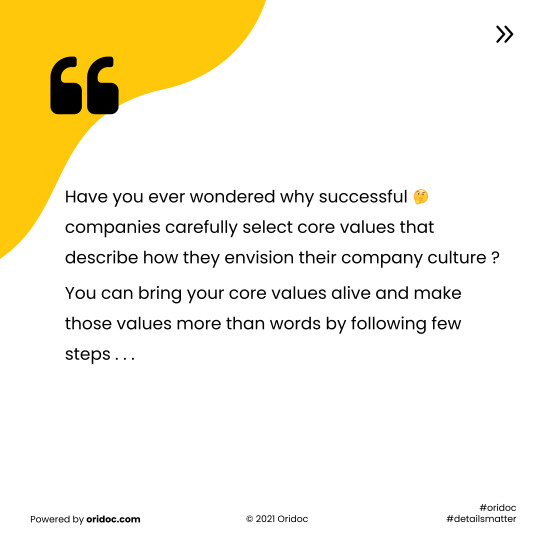
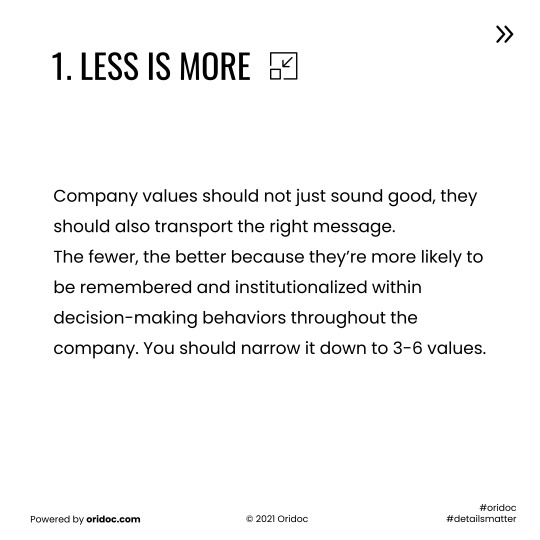
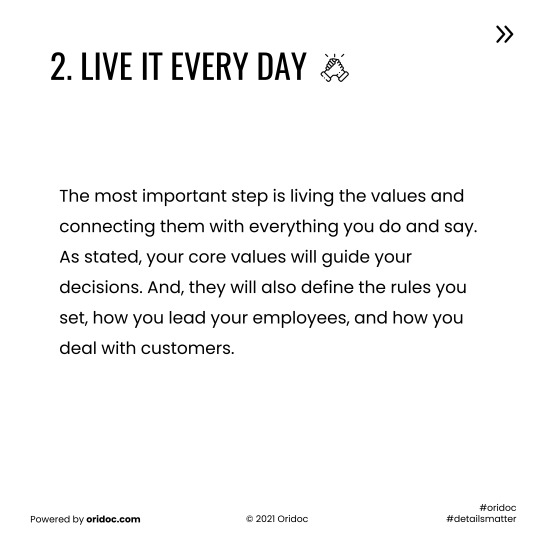
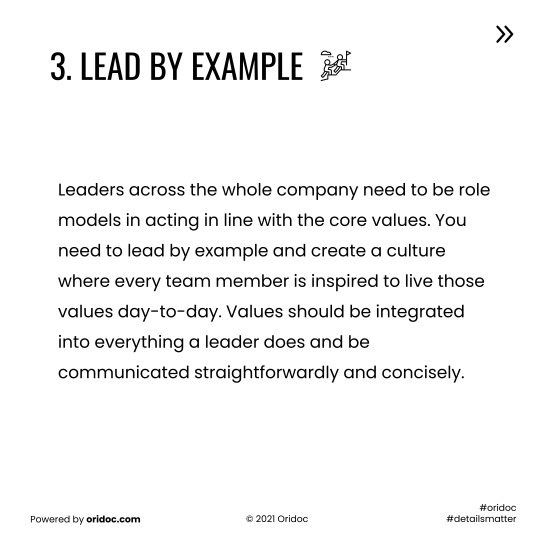
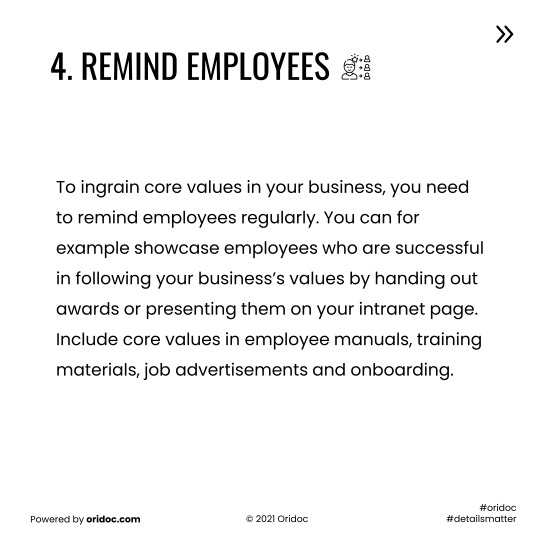
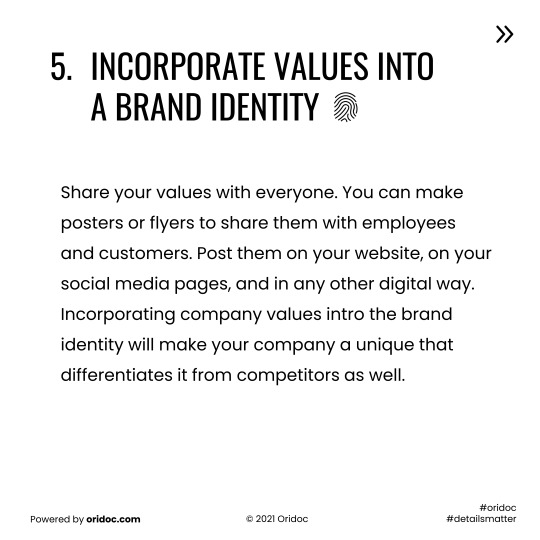
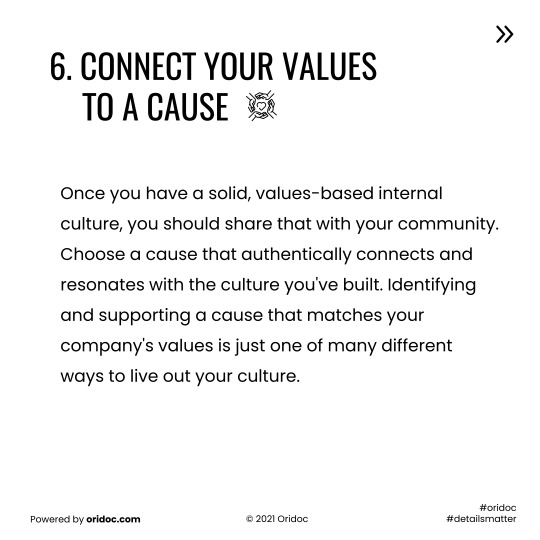
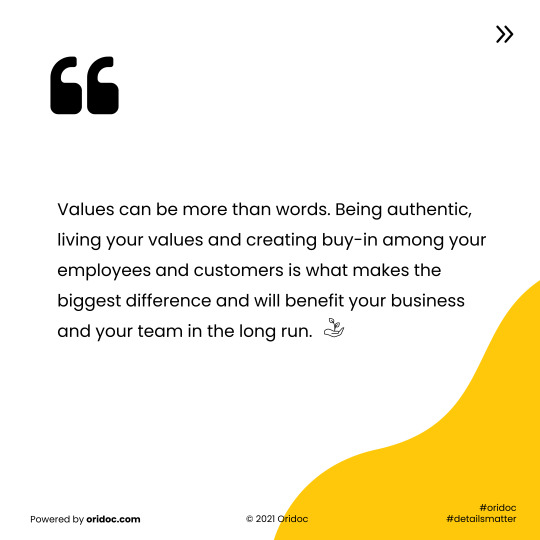
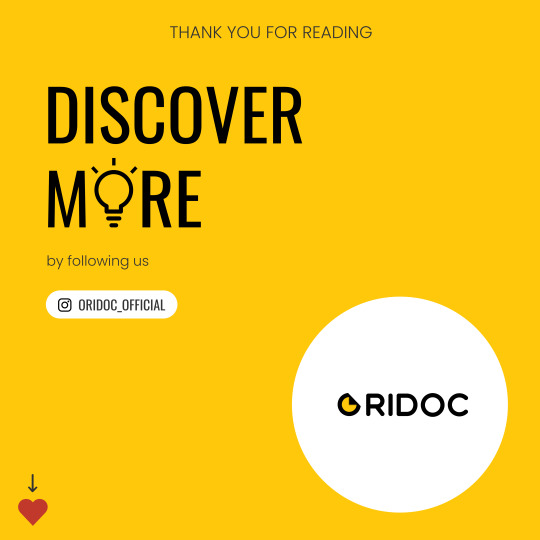
Have you ever wondered why successful companies carefully select core values that describe how they envision their company culture? How can a few words make a difference in the success of a company? Here's how to bring your core values alive instead of letting them die slowly in your employee manual. ➡️ https://www.oridoc.com/bring-company-core-values-alive-how-to-go-beyond-more-than-just-words/ #corevalues #companyvalues #valuesmatter #corporatevalues #values #excellence #valuedriven #workplacevalues #valuedriveculture #companyvaluesmatter #weloveourwork #detailsmatter #inthedetails #howto #givingback #corporate #leadership #success #integrity #teamwork #passionatework #management #humanresources #oridoc #consultancy #ondernemer #Unternehmer #Unternehmerinnen #entrepreneur
#corevalues#company values#values matter#values#corporate values#excellence#valuedriven#Work place values#value driven culture#company values matter#welovetowork#detailsmatter#inthedetails#howto#givingback#corporate#leadership#success#integrity#teamwork#passionatework#management#human resources consulting#oridoc#Consultancy#onder#unternehmer#Unternehmerin#entrepreneur#entrepreneurship
0 notes
Text
The Spiritual Compass: Navigating Workplace Challenges with Integrity and Purpose

In the bustling corridors of modern business, the pursuit of profits often overshadows the deeper values that guide our actions. Companies are locked in a perpetual dance with the bottom line, striving to maximize returns while grappling with the ethical quandaries that arise along the way. Yet, amidst this relentless pursuit of financial success, there exists a profound truth—one that transcends the realms of commerce and taps into the very essence of our humanity: the principle of integrity.
"Balancing Values and Profits: Resolving Workplace Challenges with Integrity" isn't just about corporate governance or regulatory compliance; it's about aligning our actions with our innermost values, even when faced with the most formidable of obstacles. In this journey toward ethical leadership, spirituality emerges as a potent force—a guiding light that illuminates our path and infuses our endeavors with purpose and meaning.
At its core, spirituality speaks to the interconnectedness of all things—the recognition that we are part of something greater than ourselves. In the context of the workplace, this translates into a profound sense of responsibility toward our colleagues, our customers, and the world at large. It calls upon us to lead with compassion, empathy, and humility—to recognize the inherent dignity and worth of every individual we encounter on our professional journey.
So, how do we integrate spirituality into the fabric of our organizations, transforming them into beacons of integrity and purpose? Let's explore some key strategies for navigating workplace challenges with a spiritual compass:
Mindful Leadership: At the heart of spiritual leadership lies mindfulness—the practice of being fully present in the moment, with a heightened awareness of our thoughts, feelings, and actions. Mindful leaders cultivate a deep sense of introspection, enabling them to make decisions that are aligned with their values and principles. By fostering a culture of mindfulness within their teams, leaders can create space for reflection, empathy, and authentic connection, fostering trust and collaboration amidst adversity.
Servant Leadership: In the spiritual tradition, service is revered as the highest form of leadership—a selfless commitment to the well-being of others. Servant leaders prioritize the needs of their team members above their own, empowering them to grow, flourish, and fulfill their potential. By embodying the qualities of humility, empathy, and stewardship, servant leaders inspire loyalty and devotion, fostering a sense of purpose and belonging within their organizations.
Ethical Decision-Making: Spirituality provides a moral compass—a guiding force that directs our actions toward the greater good. Ethical decision-making requires us to consider not only the immediate consequences of our choices but also their long-term impact on the well-being of others and the world around us. By cultivating virtues such as honesty, integrity, and compassion, we can navigate ethical dilemmas with clarity and conviction, upholding our values in the face of temptation and adversity.
Purpose-Driven Culture: At its essence, spirituality is about finding meaning and purpose in our lives and work. Organizations that embrace a purpose-driven culture tap into the collective aspirations of their employees, aligning their efforts toward a shared vision of a better world. By articulating a compelling purpose that transcends profit-seeking and fosters a sense of belonging and contribution, companies can inspire passion, creativity, and innovation, driving sustainable growth and impact.
Resilience and Well-Being: In the fast-paced world of business, resilience is essential for navigating the inevitable ups and downs of the journey. Spirituality offers practices such as meditation, mindfulness, and self-care that promote emotional, mental, and physical well-being, enabling us to weather the storms of uncertainty with grace and equanimity. By prioritizing the holistic well-being of their employees, organizations can cultivate a culture of resilience, adaptability, and vitality, ensuring sustainable success in the long run.
In conclusion, "Balancing Values and Profits: Resolving Workplace Challenges with Integrity" is not just a corporate imperative—it's a spiritual calling. By infusing our organizations with the timeless wisdom of spirituality, we can transcend the narrow confines of profit-seeking and embrace a more expansive vision of success—one that honours the inherent dignity of every individual, fosters a sense of interconnectedness and belonging, and empowers us to create a world that is more just, compassionate, and sustainable for generations to come. As we embark on this sacred journey of leadership and service, let us remember that true success is not measured by the size of our bottom line, but by the depth of our integrity and the richness of our contribution to the greater good.
#IntegrityInBusiness#EthicalLeadership#WorkplaceValues#ProfitWithPurpose#BusinessEthics#SpiritualLeadership#BalancedSuccess#EthicalBusiness#CorporateIntegrity#ValuesDriven#IntegrityMatters#PurposefulProfit#MindfulLeadership#EthicalDecisions#SustainableSuccess
1 note
·
View note
Text
Nurturing the Soul: Kirat Karni and the Spiritual Essence of Honest Earning

Prelude:
In the tapestry of spiritual wisdom, the concept of Kirat Karni stands as a beacon, guiding individuals toward a life of righteous deeds and honest earning. Rooted in Sikh philosophy, the mantra "Sachee Dharam Karan Keejaai" invites us to perform actions with integrity and righteousness. This exploration delves into the profound spiritual significance of Kirat Karni and its universal relevance, resonating with the hearts and minds of LinkedIn's readership.
Kirat Karni: Beyond Financial Transactions:
At its core, Kirat Karni extends far beyond the realm of financial transactions. It embodies the ethos of performing one's duties with honesty, sincerity, and a commitment to righteousness. The mantra "Sachee Dharam Karan Keejaai" underscores the importance of engaging in actions that not only contribute to personal well-being but also uphold the principles of justice, fairness, and ethical conduct.
Sachee Dharam Karan Keejaai: The Call to Righteous Action:
The opening words of the mantra, "Sachee Dharam Karan Keejaai," resonate as a call to righteous action. Kirat Karni emphasizes the importance of aligning one's professional and personal pursuits with a higher moral compass. By choosing a path of integrity, individuals embark on a journey of self-discovery and contribute positively to the greater good.
Honest Earning as a Spiritual Practice:
Kirat Karni recognizes that the way we earn our livelihood is not separate from our spiritual journey—it is an integral part of it. Honest earning becomes a spiritual practice, an avenue for personal growth, and a means to foster a harmonious connection with the world. The mantra encourages individuals to view their professional endeavours as a sacred opportunity for self-realization.
Beyond Financial Gain:
While financial prosperity is a natural outcome of diligent work, Kirat Karni emphasizes that the pursuit of wealth should not compromise ethical principles. The mantra invites individuals to consider the broader impact of their actions, fostering a mindset that seeks prosperity not just for personal gain but for the collective well-being of society.
The Relevance of Kirat Karni in the Modern Professional Landscape:
In an era marked by economic complexities, technological advancements, and a shifting corporate landscape, the principles of Kirat Karni offer a timeless guide for individuals navigating the challenges of the modern workplace. Its relevance extends beyond cultural and religious contexts, providing universal insights for fostering ethical conduct and personal fulfillment.
Integrity in Professional Relationships:
Kirat Karni calls for integrity in all professional relationships, urging individuals to uphold honesty, transparency, and fairness. In a world where trust is a valuable currency, these principles become the cornerstone for building strong, enduring connections with colleagues, clients, and stakeholders.
Contributing to Social and Environmental Well-being:
The ethical dimensions of Kirat Karni extend to the impact of one's work on society and the environment. Individuals are encouraged to consider the broader consequences of their professional choices, contributing to social causes and adopting sustainable practices that prioritize the well-being of the planet and future generations.
Personal Fulfillment and Professional Success:
Contrary to the notion that personal fulfillment and professional success are mutually exclusive, Kirat Karni suggests that they are interconnected. By aligning one's work with ethical principles, individuals create a foundation for enduring success that goes beyond financial achievements, encompassing a sense of purpose, satisfaction, and positive impact.
Mindful Leadership:
In leadership roles, Kirat Karni guides individuals to lead with authenticity and ethical acumen. Leaders who embody these principles inspire trust, loyalty, and a positive organizational culture. The mantra becomes a compass for decision-making, fostering a leadership style that prioritizes the well-being of employees and the broader community.
Cultivating Kirat Karni in Daily Professional Life:
The integration of Kirat Karni into daily professional life requires conscious effort and commitment. Here are practical steps for individuals seeking to embrace the principles of honest earning and righteous action:
1. Reflect on Values: Take time to reflect on personal and professional values. What principles are non-negotiable? How can these values guide decision-making in the workplace?
2. Align Career Choices: Ensure that career choices align with ethical principles and personal values. Seek opportunities that resonate with a sense of purpose and contribute positively to society.
3. Foster a Culture of Integrity: In leadership roles, cultivate a culture of integrity within the organization. Encourage open communication, transparency, and ethical decision-making at all levels.
4. Prioritize Social Responsibility: Integrate social responsibility into professional endeavours. Support community initiatives, adopt sustainable practices, and contribute to causes that align with personal values.
5. Continuous Learning: Stay informed about ethical practices in your industry. Embrace a mindset of continuous learning and adaptability, recognizing that ethical standards evolve with time.
Wrap-Up:
In a world driven by rapid change and multifaceted challenges, Kirat Karni emerges as a guiding principle for navigating the professional landscape with integrity and purpose. "Sachee Dharam Karan Keejaai" invites us to view our work not merely as a means of financial sustenance but as a sacred endeavour that contributes to personal growth and the betterment of society. As we embrace the principles of honest earning and righteous action, may we cultivate a workplace culture that reflects the timeless wisdom encapsulated in Kirat Karni.
#KiratKarni#HonestEarning#EthicalLeadership#SpiritualWorkplace#RighteousAction#PurposefulProfessionals#IntegrityInBusiness#HarmonyInWork#ProfessionalEthics#SoulfulWork#EthicalLiving#WorkplaceValues#CareerIntegrity#ConsciousProfessionals#HolisticSuccess#MindfulWork#EconomicEthics#BalancedProfessionals#AuthenticWork#EthicalDecisionMaking#LinkedInSpirituality
0 notes